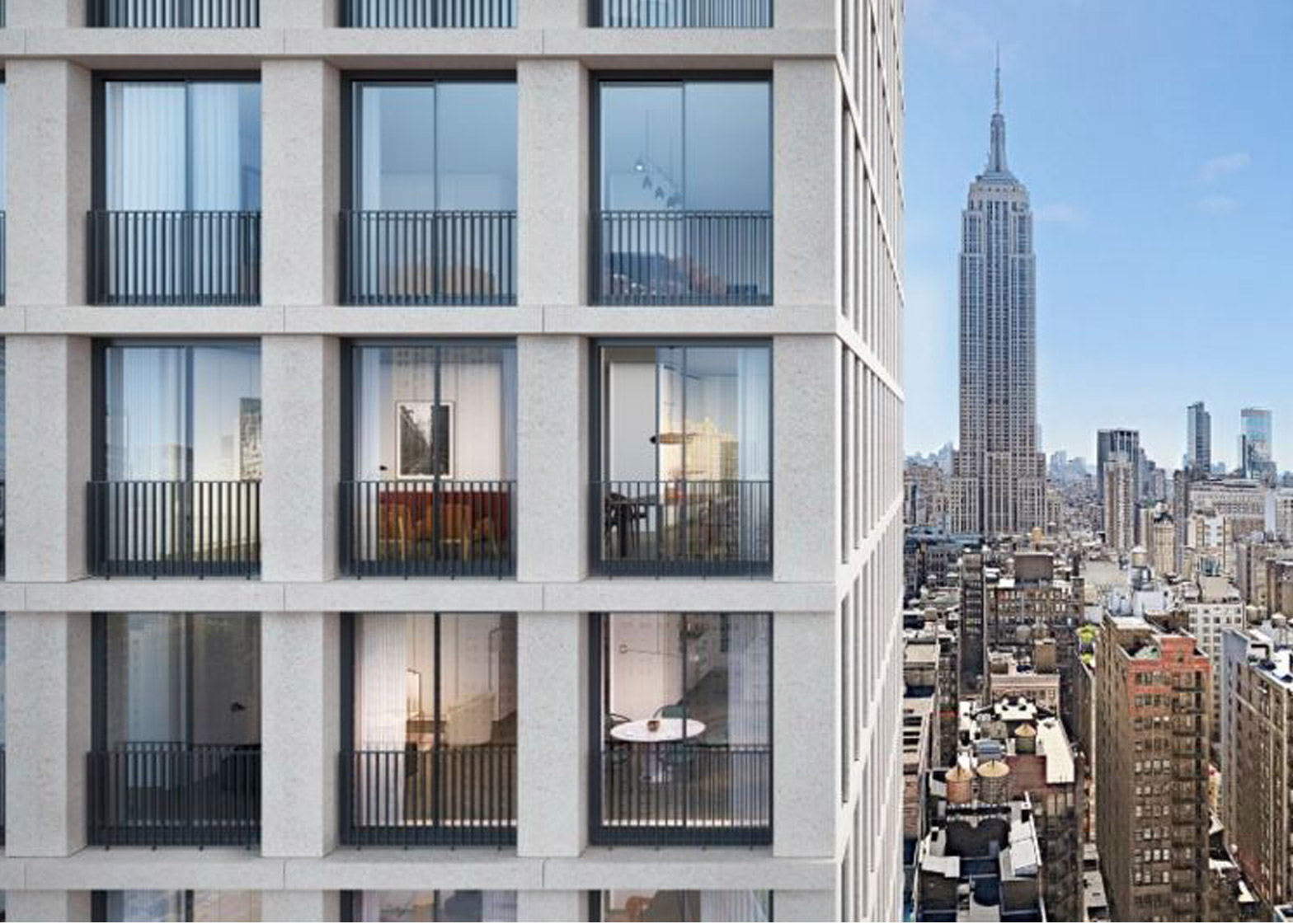Images of British architect David Chipperfield's first residential tower in Manhattan have been released to entice buyers into purchasing luxury units starting at $2 million (£1.3 million).
Called The Bryant, the 34-storey building, which will contain apartments and a hotel, is rising across the street from Bryant Park in midtown Manhattan.
Rectilinear in form, the high-rise building will have a gridded facade clad in precast concrete terrazzo panels, speckled with marble and sandstone chips.
"I think you can make architecture out of very simple things, it doesn't have to be complicated," said David Chipperfield. "The difference between a good building and a bad building normally resides in it being more thought about."
"The idea that the structure and the facade are the same thing, made out of polished concrete, will give the building a tectonic and physical presence," added the architect.
"Through this, the building is reduced down to elements of columns and windows, of solid and void, mass and space."
Chipperfield's project is being constructed on the last available lot on Bryant Park, on a site that was formerly a parking lot.
The popular 9-acre (3.6 hectares) park is ringed by historic high-rise buildings and borders the Beaux Art-style Stephen A Schwarzman Building, which houses the New York Public Library.
The tower will offer expansive views of the park and the city skyline, including the Empire State Building to the south.
The design embodies an "intelligent simplicity," which is a hallmark of Chipperfield's work, said the developer, New York-based HFZ Capital Group.
It will contain a 230-room boutique hotel on floors two to 15, with retail space and a restaurant at ground level.
Floors 15 to 34 will house 57 residential units, including two triplex penthouses.
Apartments will offer up to five bedrooms, with prices ranging from $2 million (£1.3 million) to upward of $10 million (£6.5 million). Sales for The Bryant launched this week.
"The building's custom-made aggregate terrazzo facade transitions seamlessly into the carefully considered interiors, creating crisp architectural frames to the multiple windows in each residence, as well as a border for the warm-toned herringbone floors," said the developer.
Each residence will have bespoke millwork designed by Chipperfield that "cleverly conceals storage, appliances, and mechanical systems, and allows for generous, uninterrupted ceiling heights throughout the living spaces and hallways".
Kitchens and bathrooms will offer hand-selected Italian marble finishes.
Other features include floor-to-ceiling windows, sliding doors, and at least one corner exposure.
"The Bryant is the embodiment of elegant, purposeful design and unparallelled centrality," said the developer. "This new landmark is sure to become one of the most desired addresses in all of Manhattan.
Completion is slated for the spring of 2017.
Chipperfield is no newcomer to New York. He designed the Bryant Park Hotel in 2001, which entailed the conversion of the 1924 American Radiator Building.
He also recently oversaw the renovation of the Takashimaya Building and designed the Manhattan flagship store for the fashion house Valentino, which is located inside the building.
In March, Chipperfield was commissioned to design a new wing for The Metropolitan Museum of Art in New York that will house contemporary and modern art.
Manhattan is currently experiencing a boom in high-end residential towers, ranging from a skinny skyscraper by Foster + Partners to a rash of super-tall towers that have sparked protests due to the long shadows they cast over Central Park.
In a piece for Dezeen, architect Steven Holl said that "architecture with a sense of social purpose is becoming increasingly rare". Dezeen columnist Aaron Betsky has also said that the towers are part of Manhattan's transformation into a Capitalist holy land with no space for the poor.

